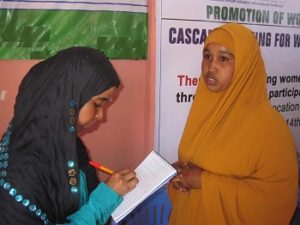Lesson Learned: As women become empowered or even make attempts to improve their situation, they may face reprisals at home and in the community. Women’s empowerment can shift relationships between the women and men in their family and community, or just be perceived to do so. This potentially puts the women at risk of reprisals including violence. Protection should be both theoretical (a component of the training) and practical (for example details of a helpline or drop-in centre that women might turn to if they feel that they are at risk of violence). Pro-active protection actions, for example those that work with men to change attitudes and behaviours towards women, might also be integrated into a project that primarily focuses on women.
